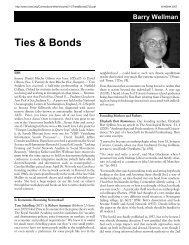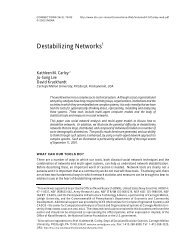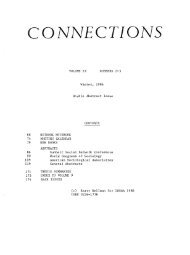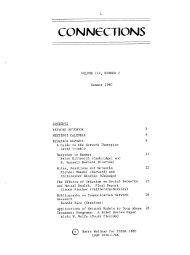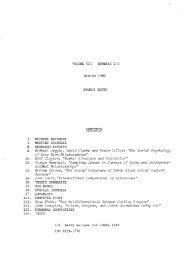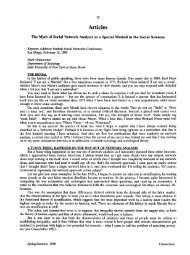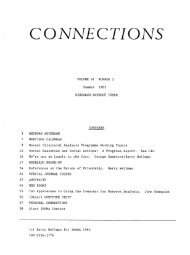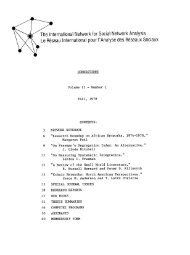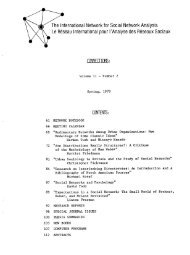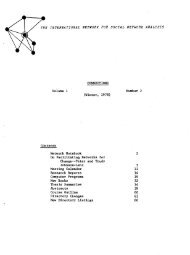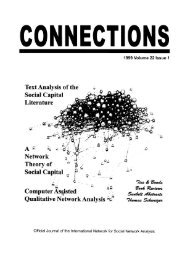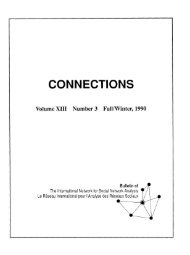Sunbelt XXXI International Network for Social Network ... - INSNA
Sunbelt XXXI International Network for Social Network ... - INSNA
Sunbelt XXXI International Network for Social Network ... - INSNA
You also want an ePaper? Increase the reach of your titles
YUMPU automatically turns print PDFs into web optimized ePapers that Google loves.
Flows Of Cultural Consecration: Who Benefits From Film Festivals?Jensen, Michael; Kim, Heeyon<strong>Network</strong>s and CultureCulture, Film, Academy AwardsSUN.AM2The number of film festivals has grown dramatically in the last decades. Film festivals are increasingly viewed as key mechanisms not only to promoteindividual films but also to promote national film industries. It is, however, not clear who actually benefits from film festivals and the cultural consecrationassociated with participating in and winning awards at the most prestigious film festivals, such as the film festivals Cannes, Berlin, and Venice. We useextensive data on the film industries in 20 European countries to examine the extent to which the cultural consecration associated with film festivals providesfuture benefits <strong>for</strong> film projects by 1) the individual film festival participants (e.g., producers, directors, actors, writers) themselves (participant spillover), 2) theindividual film festival participants’ network partners (network spillover), and 3) the individual film festival participants’ home country (national spillover). Weare particularly interested in how the structure of the national film networks affects leveraging individual film festival success to national film industry success.Following The Flow: <strong>Network</strong>ed Governance In WaterMoore, Michele‐LeeQualitative and Mixed Method <strong>Network</strong> studiesMixed Methods, Governance, <strong>Social</strong> <strong>Network</strong> Analysis, Innovation, Water, Cross‐scaleTHURS.AM2New actors in water governance have been emerging since the early 1990s at the global level and have self organized into the <strong>for</strong>m of a network. The networkhas been institutionalizing certain norms about how the world’s water should be governed, particularly advocating one specific governance innovation – thecreation of water governance institutions according to watershed boundaries rather than traditional political boundaries. Some scholars now claim that this isevidence of networked governance. Accepting the premise that watershed or river basin governance organizations may be connected to a global network, thispaper hypothesizes that networked governance involves more than just diffusing an innovation. Using case studies of the Murray‐Darling Basin Authority(Australia) and the Bang Pakong River Basin Commitee (Thailand), traditional tools of social network analysis are combined with a grounded theory approach tobetter understand how and why river basin organizations are connected to a global network of water experts and the implications of the linkages <strong>for</strong> watergovernance. Results suggest that river basin organizations are highly connected, but not to a single purpose, strategically designed network. Rather, thenetwork is complex, multi‐scalar, and involves a diverse combination of resources flowing through any individual tie. Additionally, this paper cites empiricalevidence to argue that “governing” in networked governance involves providing the capacity <strong>for</strong> further innovations – helping to navigate certain technicalissues, legitimizing and reassuring staff in the process of significant paradigmatic and governance shifts, and motivating ongoing innovation processes.



